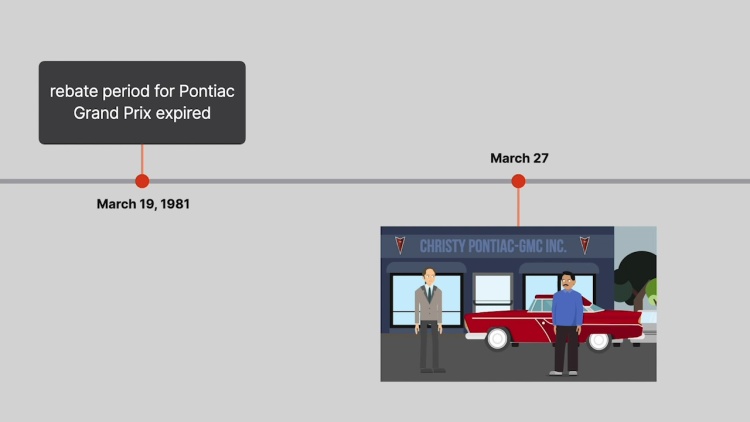State v. Christy Pontiac-GMC, Inc.
Minnesota Supreme Court
354 N.W.2d 17 (1984)

- Written by Sara Rhee, JD
Facts
Christy Pontiac (defendant) is a corporation engaged in the sale of GM automobiles. In 1981, Christy Pontiac offered a rebate program to its customers. Those who purchased a car during a specific period were entitled to a rebate, paid in part by GM and in part by Christy Pontiac. On March 27, James Linden picked up a new car from Phil Hesli, a salesman and mid-level manager. Although the rebate period for that car had ended on March 19, Hesli said that he would try to obtain the rebate for Linden. Hesli submitted a rebate application to GM with Linden’s forged signature on the form. He marked the date of sale as March 19 and signed off on the form as the “Sales Manager or Officer of the Company.” On April 16, Ronald Gores purchased a car at Christy Pontiac. Because the rebate period for that car had ended on April 4, he was told that he was ineligible for a rebate. However, Hesli submitted a rebate application to GM on behalf of Gores. Hesli forged Gores’ signature and marked the date of sale as April 3. The form was signed by Gary Swandy, an officer of Christy Pontiac. Linden and Gore subsequently became aware of the forgeries when they received copies of the application from Christy Pontiac. They informed James Christy, the owner, of the mistake. In his conversation with Gores, Christy attempted to pay Gores half the rebate to settle the situation. Later, the Attorney General’s office contacted Christy. Afterwards, Christy contacted GM and cancelled the rebate for Gores, which GM had authorized. Christy Pontiac was convicted of two counts of theft by swindle and two counts of aggravated forgery. Christy Pontiac appealed, arguing that a corporation cannot be prosecuted for theft or forgery and that there was insufficient evidence that Christy Pontiac had performed the acts at issue.
Rule of Law
Issue
Holding and Reasoning (Simonett, J.)
What to do next…
Here's why 909,000 law students have relied on our case briefs:
- Written by law professors and practitioners, not other law students. 47,100 briefs, keyed to 997 casebooks. Top-notch customer support.
- The right amount of information, includes the facts, issues, rule of law, holding and reasoning, and any concurrences and dissents.
- Access in your classes, works on your mobile and tablet. Massive library of related video lessons and high quality multiple-choice questions.
- Easy to use, uniform format for every case brief. Written in plain English, not in legalese. Our briefs summarize and simplify; they don’t just repeat the court’s language.







